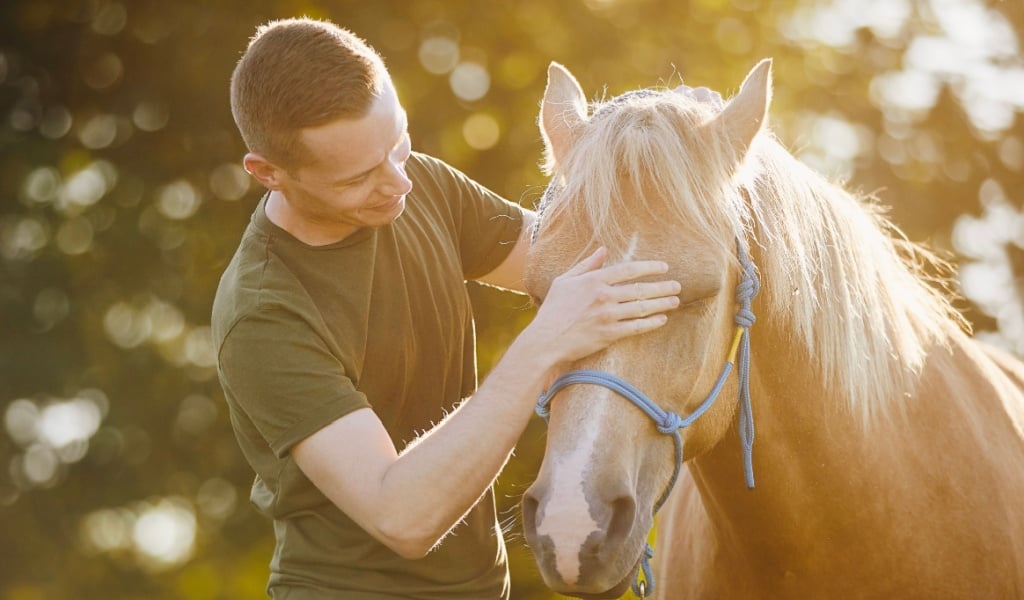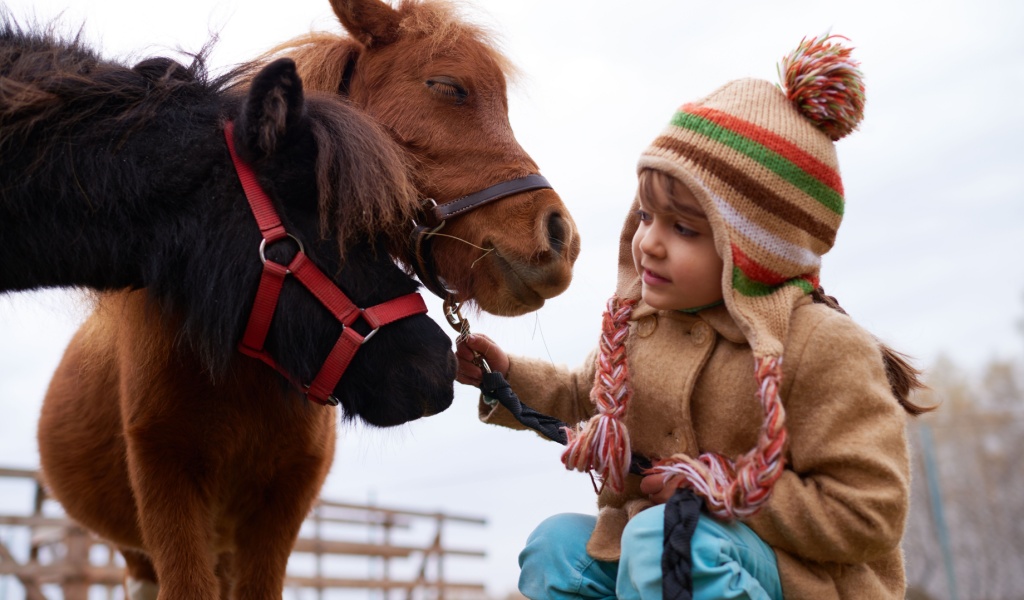Animals have always been considered a source of emotional support for people. But beyond the pet-owner relationship that many people cherish, did you know that animals are also used in therapeutic settings, particularly for people who are struggling to navigate through life’s challenging experiences?
Not many people will typically associate a horse barn as a location for mental health therapy. It might seem absurd to most, but equine-assisted therapy has numerous proven benefits. If you’re picturing a horse with glasses sitting cross-legged on a couch and asking, “And how does that make you feel?” – that’s not how it works! Equine-assisted therapy is a team effort where a mental health professional works closely with a horse specialist, and patients participate in these joint programs to seek help for their mental health struggles.

What Is Equine-Assisted Therapy?
Equine-assisted therapy is a treatment course that incorporates horses into the therapeutic process. By engaging in activities like riding, feeding, grooming, and leading a horse, people develop skills like self-awareness, responsibility, self-confidence, empathy, and better emotional regulation.
This type of therapy focuses more on learning to care for horses than on learning to ride them. Caring for horses requires concentration, selflessness, and teamwork.
How Does Equine-Assisted Therapy Help Mental Health?
Different types of animals are used in the psychotherapeutic process, but horses have a set of unique traits that make them a great option for animal-assisted therapies. These are:
Non-Judgmental Communication
Even if therapists want to offer the safest space for patients to explore their emotional experiences, some patients are uncomfortable sharing their deepest and darkest thoughts. Even if they eventually trust their doctor, it will come after a long process of building trust.
On the other hand, having a horse present offers a sense of peace and calm because it only reacts to the client’s emotions and behavior without any threat of bias or judgment of emotional experiences.
Horses Mirror Behavior
Horses are very sensitive and vigilant to emotions and movements. Through keen observation, they mirror the patient’s feelings and behavior, conveying a subtle connection that makes them feel safe.
At the same time, patients are made to be more self-aware, as they will use the horse’s interactions and behavior as feedback to process what is happening at that particular moment.
Helps Manage Vulnerability
Opening up about past experiences, life trauma, or emotional challenges can make patients feel very vulnerable. The horse can serve as a reference point for processing emotions. For example, if opening up about a particular experience is painful, using the horse as an example and aligning their experience with the horse’s experience can make it a little bit easier for the client. When the content is externalized in such a manner, approaching and processing emotions can be more manageable.
Caring for a horse is not easy; it requires much work, such as feeding, grooming, watering, and exercising. Extending this type of care can be therapeutic for many as it establishes routine and structure. Moreover, the act of caring and nurturing the horse can also build empathy.

Some Mental Health Conditions That Equine-Assisted Therapy Is Effective For
Anxiety Disorders
Over 17 million people in America suffer from anxiety disorders. Of course, every person experiences some level of anxiety at some point in their life, but there are instances where anxiety can be so serious that it meets the clinical diagnostic criteria. Anxiety-related conditions include panic disorders, selective autism, specific phobias, social anxiety disorder, generalized anxiety disorder, and separation anxiety, among many others.
People who struggle with anxiety issues find themselves stuck in the past and fearful of the future. With equine-assisted therapy, patients can stay present and focused on the task at hand, which can help them navigate their anxiety.
Horses are very vigilant, and they can sense and respond to danger with great awareness, which leads to a change in their behavior. So, patients who have anxiety struggles can relate to this ability to sense and respond to any danger. This helps them practice vulnerability in a safe environment, allowing them better to process their own experiences, fears, and challenges.
Post-Traumatic Stress Disorder (PTSD)
People who have PTSD describe it as a debilitating experience of feeling heightened emotions after a traumatic event. Young children, teenagers, and adults struggle with PTSD, and they feel like their nightmarish experience can never allow them to bond with someone ever again or feel a personal connection. However, they may be able to feel a better sense of connection with their horse and slowly incorporate that into their lives and relationships.
Treatment for Addictions
The number of people who are addicted to drugs and alcohol is continuing to rise. What’s even worse is that most of these addictions result in opioid use, resulting in nearly 50,000 deaths. Needless to say, the need for therapy to treat addiction cannot be stressed enough!
Equine-assisted therapy is a unique way to treat addiction problems. Oftentimes, clients resort to addictions as a way to deal with hurts within relationship dynamics. So, learning to trust again, communicate effectively, and practice vulnerability can be a massive challenge in addiction treatment. Thankfully, with equine-assisted therapy, patients slowly learn to develop trust through their interactions with the horse. They gradually learn to regain a sense of safety, which can encourage them to be vulnerable as they explore new things.
Bottom Line
A lot of research is still being done on the subject of equine-assisted therapy. While evidence thus far doesn’t point out that this can replace evidence-based treatments for people struggling with mental health conditions, there are some undeniable benefits.
Many people find that caring for horses can relieve their anxiety conditions and allow them to communicate more effectively. Moreover, it will enable patients to acknowledge and address their mental anxieties in a new way, with the support of a non-judgmental animal companion.
Finally, make sure that you speak to a trained mental health provider before determining if equine-assisted therapy is a good option for you or a loved one. For example, if the patient is afraid of animals or has a past traumatic experience related to an animal, equine-assisted therapy can do more harm than good. Generally, there will be an assessment process to determine if equine-assisted therapy is right for you so you can discuss it with your mental health professional.



